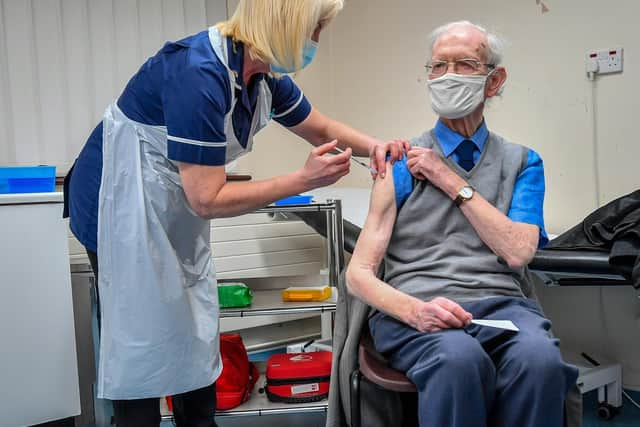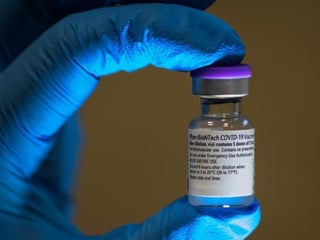West Yorkshire granddad discovers second Covid jab delayed by 12 weeks
The roll-out of the Pfizer/BioNTech vaccine began in early December, with NHS workers and older people receiving the first injections in Leeds.
Initially, receivers of the vaccine were to wait three weeks before their second dose of the vaccine, in order to be fully vaccinated against Covid-19.
Advertisement
Hide AdAdvertisement
Hide AdLen Barker, 86, from Castleford, received his vaccine in December and was due to have the second one on Friday, January 8 - but it has now been cancelled.


Mr Barker said that he accepts the change, as he trusts the doctors, but his granddaughter Helen has asked for clarity about how protected he is with just one dose of the vaccine.
Mr Barker said: "I had my first vaccine a few weeks ago and was meant to have the second this Friday but thought I had better double check after seeing the news.
"The doctors said it was delayed and they were a bit confused about when I would have it.
Advertisement
Hide AdAdvertisement
Hide Ad"However, the challenge is to get that first one and I am somewhat protected now so I don't think I can moan much about it.
"I understand the argument is to give more people the chance to get the vaccine so that seems logical.
"I have to rely on the them [the medical experts] because they know more than I do.
"It's okay for me and my wife to wait 12 weeks and, at the end of the day, there's not much we can do about it anyway by screaming and shouting."
Advertisement
Hide AdAdvertisement
Hide AdThe Government announced this week that it would be prioritising administering a first dose of either the Pfizer/BioNTech or Oxford/AstraZeneca vaccine to as many people as possible, rather than holding back injections to give second doses to those who had already received the first.
It was proposed that a second dose would now come up to 12 weeks later, rather than three weeks.
In a statement, the Government said: “Having studied evidence on both the Pfizer/BioNTech and Oxford University/AstraZeneca vaccines, the JCVI has advised the priority should be to give as many people in at-risk groups their first dose, rather than providing the required two doses in as short a time as possible.”
The British Society for Immunology said that while it would prefer the original dosing schedules, as tested in clinical trials, be followed, it accepted the rationale for the change.
Advertisement
Hide AdAdvertisement
Hide AdGranddaughter Helen Johnson, 25, added: "If pushing back the second dose allows more people to have the first dose of the vaccine then this is beneficial, but there's just a lack of clarity at the moment in regards to how protected people are after just one dose."
Companies Pfizer and BioNTech expressed concern about the delays to the second dose, due to a lack of data about the protection it will offer.
In a joint statement, Pfizer and BioNTech said: “The safety and efficacy of the vaccine has not been evaluated on different dosing schedules as the majority of trial participants received the second dose within the window specified in the study design.
“There is no data to demonstrate that protection after the first dose is sustained after 21 days.”
Advertisement
Hide AdAdvertisement
Hide Ad“For example, to make contact with even just 2,000 elderly or vulnerable patients will take a team of five staff at a practice about a week, and that’s simply untenable.
“The government must see that it’s only right that existing bookings for the oldest and most vulnerable members of our society are honoured, and it must also as soon as possible publish a scientifically validated justification for its new approach.
“As doctors, we believe this can and should be done even as practices and the wider NHS step up the Covid-19 vaccination programme to deliver initial doses of vaccination to other vulnerable people, including frontline healthcare professionals - many of whom have still not even received their first vaccination.”
